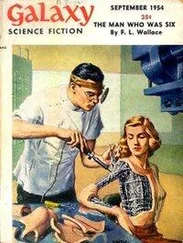I could tell them, of course. I could go out and buttonhole them one by one and hold them fast until I told them what I thought. And they would understand, for Juwainism would make them understand. But they wouldn’t pay attention. They’d tuck it all away in the backs of their brains somewhere for future reference and they’d never have the time or take the trouble to drag it out again.
They’d go on doing the foolish things they’re doing, following the footless hobbies they have taken up in lieu of work. Randall with his crew of zany robots going around begging to be allowed to re-design his neighbors’ homes. Ballentree spending hours on end figuring out new alcoholic mixtures. Yes, and Jon Webster wasting twenty years digging into the history of a single city.
A door creaked faintly and Webster swung around. The robot catfooted into the room.
“Yes, what is it, Roscoe?”
The robot halted, a dim figure in the half-light of the dusk-filled room.
“It’s time for dinner, sir. I came to see—”
“Whatever you can think up,” said Webster. “And, Roscoe, you can lay the fire.”
“The fire is laid, sir.”
Roscoe stalked across the room, bent above the fireplace. Flame flickered in his hand and the kindling caught.
Webster, slouched in his chair staring at the flames crawling up the wood, heard the first, faint hiss and crackle of the wood, the suction mumble at the fireplace throat.
“It’s pretty, sir,” said Roscoe.
“You like it, too?”
“Indeed I do.”
“Ancestral memories,” said Webster, soberly. “Remembrance of the forge that made you.”
“You think so, sir?” asked Roscoe.
“No, Roscoe, I was joking. Anachronisms, that’s what you and I are. Not many people have fires these days. No need for them. But there’s something about them, something that is clean and comforting.”
He stared at the canvas above the mantelpiece, lighted now by the flare of burning wood. Roscoe saw his stare.
“Too bad about Miss Sara, sir.”
Webster shook his head. “No, Roscoe, it was something that she wanted. Like turning off one life and starting on another. She will lie up there in the Temple, asleep for years, and she will live another life. And this one, Roscoe, will be a happy life. For she would have it planned that way.”
His mind went back to other days in this very room.
“She painted that picture, Roscoe,” he said. “Spent a long time at it, being very careful to catch the thing she wanted to express. She used to laugh at me and tell me I was in the painting, too.”
“I don’t see you, sir,” said Roscoe.
“No. I’m not. And yet, perhaps, I am. Or part of me. Part of what and where I came from. That house in the painting, Roscoe, is the Webster House in North America. And I am a Webster. But a long ways from the house—a long ways from the men who built that house.”
“North America’s not so far, sir.”
“No,” Webster told him. “Not so far in distance. But far in other ways.”
He felt the warmth of the fire steal across the room and touch him.
Far. Too far—and in the wrong direction.
The robot moved softly, feet padding on the rug, leaving the room.
She worked a long time, being very careful to catch the thing she wanted to express .
And what was that thing? He had never asked her and she had never told him. He had always thought, he remembered, that it probably had been the way the smoke streamed, wind-whipped across the sky, the way the house crouched against the ground, blending in with the trees and grass, huddled against the storm that walked above the land.
But it may have been something else. Some symbolism. Something that made the house synonymous with the kind of men who built it.
He got up and walked closer, stood before the fire with head tilted back. The brush strokes were there and the painting looked less a painting than when viewed from the proper distance. A thing of technique, now. The basic strokes and shadings the brushes had achieved to create illusion.
Security. Security by the way the house stood foursquare and solid. Tenacity by the way it was a part of the land itself. Sternness, stubbornness and a certain bleakness of the spirit.
She had sat for days on end with the visor beamed on the house, sketching carefully, painting slowly, often sitting and watching and doing nothing at all. There had been dogs, she said, and robots, but she had not put them in, because all she wanted was the house. One of the few houses left standing in the open country. Through centuries of neglect, the others had fallen in, had given the land back to the wilderness.
But there were dogs and robots in this one. One big robot, she had said, and a lot of little ones.
Webster had paid no attention—he had been too busy.
He swung around, went back to the desk again.
Queer thing, once you came to think of it. Robots and dogs living together. A Webster once had messed around with dogs, trying to put them on the road to a culture of their own, trying to develop a dual civilization of man and dog.
Bits of remembrance came to him—tiny fragments, half recalled, of the legends that had come down the years about the Webster House. There had been a robot named Jenkins who had served the family from the very first. There had been an old man sitting in a wheel chair on the front lawn, staring at the stars and waiting for a son who never came. And a curse had hung above the house, the curse of having lost to the world the philosophy of Juwain.
The visor was in one corner of the room, an almost forgotten piece of furniture, something that was scarcely used. There was no need to use it. All the world was here in the city of Geneva.
Webster rose, moved toward it, stopped and thought. The dial settings were listed in the log book, but where was the log book? More than likely somewhere in his desk.
He went back to the desk, started going through the drawers.
Excited now, he pawed furiously, like a terrier digging for a bone.
Jenkins, the ancient robot, scrubbed his metallic chin with metallic fingers. It was a thing he did when he was deep in thought, a meaningless, irritating gesture he had picked up from long association with the human race.
His eyes went back to the little dog sitting on the floor beside him.
“So the wolf was friendly,” said Jenkins. “Offered you the rabbit.”
Ebenezer jigged excitedly upon his bottom. “He was one of them we fed last winter. The pack that came up to the house and we tried to tame them.”
“Would you know the wolf again?”
Ebenezer nodded. “I got his scent,” he said. “I’d remember him.”
Shadow shuffled his feet against the floor. “Look, Jenkins, ain’t you going to smack him one? He should have been listening and he ran away. He had no business chasing rabbits—”
Jenkins spoke sternly. “You’re the one that should get the smacking, Shadow. For your attitude. You are assigned to Ebenezer, you should be part of him. You aren’t an individual. You’re just Ebenezer’s hands. If he had hands, he’d have no need of you. You aren’t his mentor nor his conscience. Just his hands. Remember that.”
Shadow shuffled his feet rebelliously. “I’ll run away,” he said.
“Join the wild robots, I suppose,” said Jenkins.
Shadow nodded. “They’d be glad to have me. They’re doing things. They need all the help that they can get.”
“They’d bust you up for scrap,” Jenkins told him sourly. “You have no training, no abilities that would make you one of them.”
He turned to Ebenezer. “We have other robots.”
Ebenezer shook his head. “Shadow is all right. I can handle him. We know one another. He keeps me from getting lazy, keeps me on my toes.”
Читать дальше












